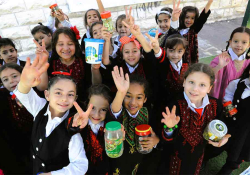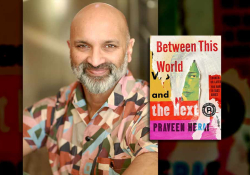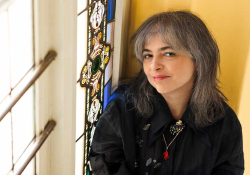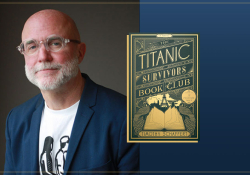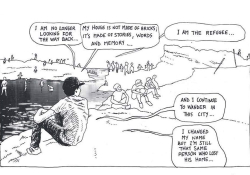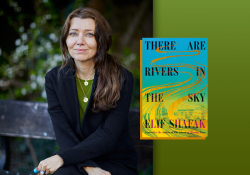Into the Woods: A Conversation with Italian Writer Maddalena Vaglio Tanet
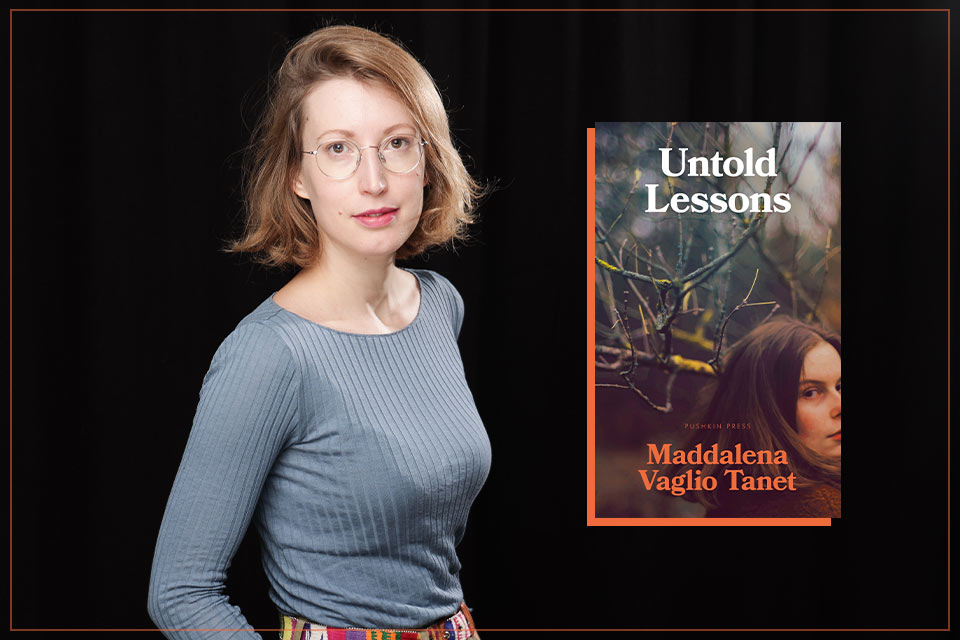
Set in a small Italian village in 1970, Maddalena Vaglio Tanet’s newly released debut novel, Untold Lessons (2024), tells the story of schoolteacher Silvia who, plagued by guilt after the suicide of one of her students, suddenly goes missing. As the entire community searches for her, fearing the worst, a child, Martino, discovers her hiding in the woods but soon realizes she does not want to be found.
Based on a true story, pieced together from newspaper clippings, community lore, and family tales, and told through language that is, as writer Lia Levi puts it, at times lyrical and at times cruel, Vaglio Tanet’s novel is a meditation on loss, guilt, compassion, and self-acceptance, set against the backdrop of the haunting Piedmontese woodland (a character in its own right).
Vaglio Tanet’s book was shortlisted for Italy’s most prestigious literary prize, the Premio Strega, in 2023, as well as for the Flaiano International Prize and the Fiesole Narrative Prize. It was awarded the Segafredo Zanetti Prize for a movie adaptation and has been translated into English by Jill Foulston. She has also published three children’s books, two of which were shortlisted for the children’s and young adult division of the Strega Prize.
In our recent conversation, we discussed the role of nature in her fiction, the symbolic connection between the forest and threshold-like existential experiences, such as death and growing up, and the refreshing strangeness of the child’s gaze.
Irene Bulla: The first line of Untold Lessons is striking in its dry, descriptive simplicity: “Instead of going to school, the teacher went into the woods.” This fork in the road is a literal representation of Silvia’s choice to leave society behind, to give up the world of the living. But the forest you describe, albeit populated by ghosts, inhuman noises, and night creatures, is hardly a space of death, seeing how every single element of it pulsates with life, or with the traces of having been alive. When Silvia enters the woods, what is she truly stepping into?
Maddalena Vaglio Tanet: At first, Silvia enters the woods almost without realizing it, her legs carrying her while she is in great distress. She does not want to be seen, she does not want to speak or be consoled, because it seems to her that there is no possible consolation for what has just happened to her student. In this sense, the forest is the opposite of the space inhabited and shaped by human beings: it is a place where there is life and death but without guilt, without sin, without mourning. Silvia would like to become part of it, like a fern or a bird, and get rid of the human conscience, but of course this is impossible. Also, she knows the woods very well, recognizes everything she sees and can name every animal and plant.
But the forest, of course, is also a literary topos (e.g. The Divine Comedy starts with Dante getting lost in a forest) and a highly symbolic place. In Grimms’ Fairy Tales, of which Silvia is a reader, the woods can be a threatening, carnivorous place (“Little Red Riding Hood”) but also a refuge, a source of salvation (“Snow White”). It is a transformative place and a threshold between the world of the dead and the world of the living. Indeed, the teacher is lingering on that threshold and does not know which way to go.
Bulla: When the teacher vanishes, the entire town searches for her. Why is it a child, and a child like Martino, who finds her?
Vaglio Tanet: Martino is an asthmatic child who has just moved to the village from a big, polluted city—the Turin of the early 1970s. He has no friends yet and is very angry with his parents who made this decision. He sets out to find the missing teacher as if it were a game, an adventure of his favorite characters from comics and movies, but when he actually finds her and Silvia asks him not to tell anyone, he obeys her. And not just because, after all, she is a teacher. Such a big secret gives meaning to his presence in the village and makes him feel important. He now has a mission: to keep the teacher alive.
Instinctively, he understands that Silvia is not yet ready to return from the woods.* When they are ashamed or angry, children go hide. Unlike an adult, Martino simply accepts that the teacher wants to stay hidden. Between the teacher and the child, a friendship begins. There is, however, also a different narrative level. Martino finds the teacher because, being a bit lonely and something of an outcast, he knows about borders and margins. He can cross the border represented by the woods and come and go from there. In the forest of fairy tales, as I said before, kids go from life to death and from death back to life, because in the forest it is childhood that perishes. They return grown up and ready to enter their community.
In the forest of fairy tales, kids go from life to death and from death back to life, because in the forest it is childhood that perishes.
Children still have the forest inside of them, they are still wild, connected to the very long, remote time of the species, and recognize what links us to animals, plants, minerals, and stars. They aren’t fully integrated into society—this is what fairy tales as rites of passage tell us—and they enter the forest to say goodbye to it and turn into adults. So, in the novel I tell about Silvia’s woods but also Martino’s. They meet there and take care of each other. Thanks to Martino, Silvia remembers that human life is not only about loss but also very much about love.
Bulla: What role do shame and guilt play in this story? They seem like powerful driving forces for the teacher and other characters. Is the forest and everything it represents a balm, an antidote to those seemingly inevitable aspects of the human condition?
Vaglio Tanet: Silvia feels guilty about what happened to her student, even though she did nothing wrong. But one’s feelings of guilt are often disproportionate. Silvia did the right thing, but the right thing triggered a tragedy. I use the word tragedy as it was understood in the theater of ancient Greece. Oedipus kills his father and marries his mother without being aware. Does he still carry this guilt? For the Greeks, he certainly does. Nowadays, what do we make of it?
Bulla: Food and the act of eating carry a considerable symbolic weight in the book. On one hand, food clearly represents a tether to life. I am thinking of the teacher slowly coming back to herself and to the world of the living by eating the buttered bread offered by Martino, or the grandmother’s notion that her sick child would have survived the night if she had only been fed zabaione (an Italian dessert of whipped eggs and sugar). At the same time, though, food and deathly images go hand in hand: Luisa’s last memory of her soon-to-be dead boyfriend picking beans, Giovanna’s ghost’s drenched schoolbook turning into aspic. Could you tell us more about this ambiguity?
Vaglio Tanet: The relationship with food is a red thread in the novel, and it concerns several characters: from the boarding-school girls who bury disgusting food in the garden to Giovanna, Silvia’s beloved student, who gathers discarded candy wrappers from the trash to wrap pebbles in them, just to give the illusion that she, like her peers, carries sweets in her pocket. And as she recalls this episode, Silvia in the woods sucks on pebbles like they were candies.
I really wanted the relationship with food to be ambivalent and to express one of the central themes of the book, which is an investigation of the moments when the wall separating life and death gets thin and permeable as a veil. The moments when one retreats from life and then, perhaps, says yes to life again. Not coming into the world, but returning to the world.
Bulla: Your novel ends with an author’s note explaining which parts of this story are historically documented and where your imagination filled in the gaps. Why did you choose to include this note?
Vaglio Tanet: The book is inspired by real events that happened more than fifty years ago to people very dear to me. I reconstructed the story from scattered allusions and fragments and then found newspaper articles about it. But I wanted to write a novel, a work of fiction that could be read without knowing that the events did, in part, really happen. My Italian publisher asked me to write an endnote, and it was an opportunity for me to quote excerpts from the articles and reflect on the specific mode of storytelling, and relationship with the truth, that pertains to the novel. I was also able to leave a small tribute to the real people, whom I love, behind the characters.
The book is inspired by real events that happened more than fifty years ago to people very dear to me.
Bulla: I am interested in your thoughts on how your work as a poet may have influenced the style and language of this book.
Vaglio Tanet: I wanted the novel to be very readable and its literary references and structure to remain unobtrusive. I conceived it as a ballad, with the teacher in the woods like a refrain and the other chapters, like stanzas, telling the stories of those who look for her (a nun, a woman about to have an affair, the teacher’s short-tempered cousin, etc.). To tell about the teacher’s first hours in the woods, when memories, hallucinations, and ghosts are visiting her, I used a language that owes much to the ways of poetry. During my doctoral studies I dedicated myself to questions of meter and to the halos and associative reverberations, of meaning and sound, that the word compressed in poetic form is capable of releasing. One can hardly notice, but in some of the passages, there are verses scattered in the prose, and I paid attention to the rhythm given by accents, alliterations, assonances, shifts, even rhymes, without letting the text become overly melodic. For me it was crucial that this kind of work on language remain almost invisible and accompany the story without compromising its readability.
Bulla: You are an author of children’s and young adult books. How did this experience influence how you approached your first novel for adults?
I am interested in the radically alienating gaze that children have on the world.
Vaglio Tanet: To me, children’s literature is literature. I think of Carlo Collodi, Astrid Lindgren, Maurice Sendak, J. M. Barrie, Philip Pullman, and many others. I am interested in the radically alienating gaze that children have on the world. It is an opportunity to rethink and re-signify our habits and ideas. I tried to make the children in the book extremely realistic and vivid. I wanted them to think like children and speak like children. There are many implausible children in books for adults.
May 2024
* Interviewer’s note: “Tornare dal bosco,” to return from the woods, is the Italian title of the novel.
Maddalena Vaglio Tanet is an Italian poet and writer. She lives in the Netherlands, where she works as a literary scout. She is the author of three award-winning children’s books. Her debut novel, Untold Lessons (Pushkin Press, 2024), was shortlisted for Italy’s most prestigious literary prize and is being translated into several languages.


